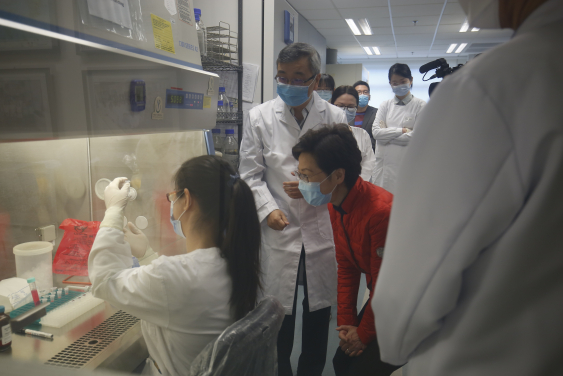Since its establishment in October 2020, an inter-disciplinary team led by Professor Tong Zhang, from the Environmental Microbiome Engineering and Biotechnology Laboratory of the Department of Civil Engineering of the Faculty of Engineering at the University of Hong Kong (HKU), has collected more than 1,200 sewage samples for tests to help the government track potential virus carriers in the community.
The research project received support from the Health and Medical Research Fund (HMRF) of the Food and Health Bureau (FHB), and is also technically backed by the Environment Bureau, with the Environmental Protection Department (EPD) and the Drainage Services Department (DSD) providing strategic planning, comprehensive analysis of the drainage network, and optimization of sample collection. The sewage monitoring system consists of several steps: sampling, inactivation, pre-concentration by centrifugation, nucleic acid extraction, gene testing, and data analysis. In the absence of a standardized and universal method for detecting new SARS-CoV-2 virus in sewage worldwide, the monitoring system was successfully developed by HKU engineering-led team last December after various trials.
Since the dawn of the 4th wave of COVID-19 outbreak last November, the HKU team has collaborated with the EPD and DSD in collecting and monitoring sewage samples in buildings near or in the area of housing estates with confirmed cases, so as to help the government assess and respond quickly to the outbreak (including issuing compulsory testing notices).
It was instrumental in identifying 10 Covid-19 cases from December 2020 to January 2021 at the Choi Wan (II) Estate - the first time worldwide infection cases were confirmed in the community through compulsory testing notice issued based on sewage test results.
Between 28 December 2020 and 9 February 2021, compulsory testing notices were issued in 26 areas where sewage test results were positive, including compulsory testing in 'restricted areas'. More than 50 confirmed cases were found, cutting off hidden transmission chains in these communities.
The team had originally planned to process and analyse around 20 samples per week, but after increasing its manpower to 15 people, its detection capacity was increased sevenfold to about 170 samples per week to help fight the pandemic.
Chief Executive Mrs Carrie Lam had a first-hand look at the University's sewage monitoring system that helps track COVID-19 in building blocks on February 15, where she was briefed by Professor Gabriel Leung, Dean of the Li Ka-shing Faculty of Medicine at HKU, and Professor Tong Zhang on the sewage testing process.
The HKU team and the Environment Bureau are working towards doubling the sewage monitoring capability and transferring the technology to commercial laboratories. At the same time, in order to optimize the overall sewage monitoring system, the HKU team is working together with EPD, DSD, and the Food and Health Bureau to develop new sewage sampling schemes. In the long run, sewage surveillance can provide public health-related information for the Government, institutions and the general public in their joint battle against the pandemic. Hong Kong's advanced technology and successful experience can also enrich the world's experiences in protecting public health and tackling the challenges of other emerging major diseases through wastewater-based epidemiology.







